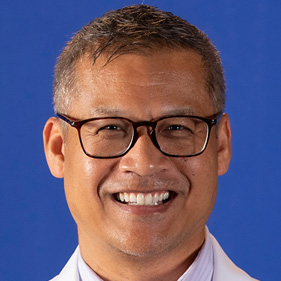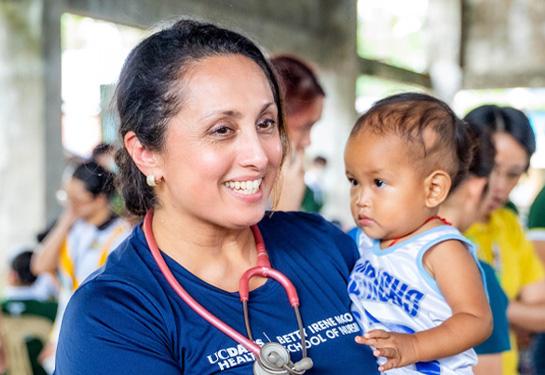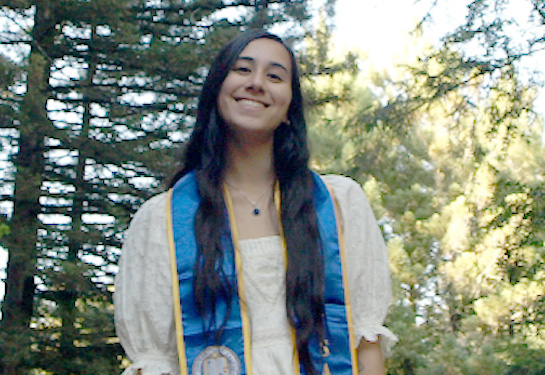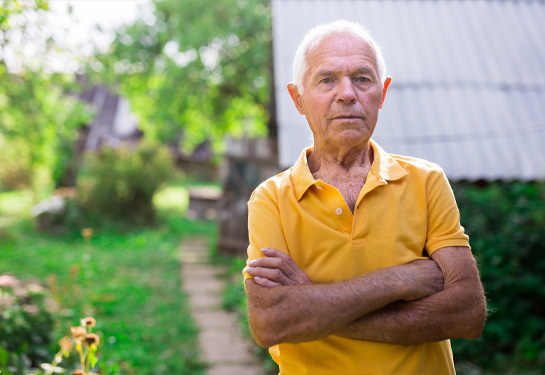Future nurse anesthetists enter doctoral program at UC Davis
Inaugural class represents a first for the UC system and the Betty Irene Moore School of Nursing
When 16 aspiring nurse anesthetists gathered in Sacramento this week, they became the first students in the University of California system to embark upon a Doctor of Nursing Practice – Nurse Anesthesia (DNP-NA) degree.
Launched by the Betty Irene Moore School of Nursing at UC Davis, the accredited program is the first for UC Davis Health and only the sixth program in the state designed to expand nurse anesthesia education to address a workforce challenge in California. The inaugural class includes students from Sacramento, the Bay Area, Ukiah, Fresno, Chico and San Diego. Program leaders say that kind of geographic diversity enriches classroom discussions and aligns perfectly with the mission to serve the entire state and not just its major metro areas.
“From the start, we’ve been intentional about creating a program that reflects the communities we serve and welcomes people from all backgrounds, life experiences and parts of the state,” said Program Director Jakkarin “Jake” Sareerak. “We’re seeing students who are first-generation college graduates, military veterans, career changers and people who’ve worked in rural hospitals or large academic centers.”
From the start, we’ve been intentional about creating a program that reflects the communities we serve and welcomes people from all backgrounds, life experiences and parts of the state.—Program Director Jakkarin “Jake” Sareerak
Students must have more than one-year experience as a nurse in a critical care setting. Critical care nurses manage unstable patients, make quick decisions and interpret complex data, which are essential skills for anesthesia. Once Certified Registered Nurse Anesthetists (CRNA), they give anesthesia and monitor patients during surgeries and procedures to keep them safe and pain-free.
The what and why
The DNP-NA program is an integrated, full-time, three-year curriculum designed to equip experienced critical care registered nurses (RNs) with the knowledge and hands-on training required to become CRNAs. The program blends rigorous online coursework with in-person simulation training and extensive clinical experience, ensuring students receive a comprehensive and immersive education.
Orientation in Sacramento is the first onsite experience for the students. Over the next three years of the program, students start with online classes and short in-person trainings, then move into hospital rotations that grow longer and more advanced each year. By the third year, they work nearly full-time in real clinical settings, gaining hands-on experience while finishing a final scholarly project.
Among those students was Dylan Scalzo. For more than four years, he has worked as a clinical nurse in the cardiothoracic ICU at UC Davis Health, including a critical care nurse fellowship. A graduate of the School of Nursing’s entry-level nursing program in 2020, he considered another school. Ultimately, UC Davis aligned with his values and checked all the boxes. He said it feels like coming home.
“I feel very at home, but also there’s a unique balance. The school is idealistic and the health system is pragmatic. The ebb and flow between those two is an interesting place to be in,” Scalzo said. “The community-driven goals are more closely aligned with provision of care in a rural setting. Working in a place like where I grew up, in Colfax, would be the dream.”
Sareerak says Scalzo and the other nurses attracted to the program will benefit because this program’s curriculum, culture and network of support reflect the mission and values of the school.
“We’ve embedded leadership development, advocacy training, cultural humility and rural health exposure into the curriculum,” Sareerak explained. “Our innovative mentorship model, consisting of faculty-to-student, student-to-student and community member-to-student connections, truly sets us apart and fosters a supportive learning community.”
In addition, the students will have the opportunity to provide input to faculty on the program’s growth and expansion.
Sareerak assembled a team of interdisciplinary CRNA faculty who, he says, are strong clinicians and educators who are involved in national committees, advocacy work and research because they are invested in the future of the profession. They, along with UC Davis Health Interim Vice Chancellor of Human Health Sciences Bruce Hall, shared their hopes for the program on the first day of orientation.
“You are pioneers in this new program! You will advance your careers and serve the diverse communities needing your expertise,” Hall said. “We are proud that you have chosen this path and cannot wait to witness how you will help care for future patients here at UC Davis Health and throughout the state.”
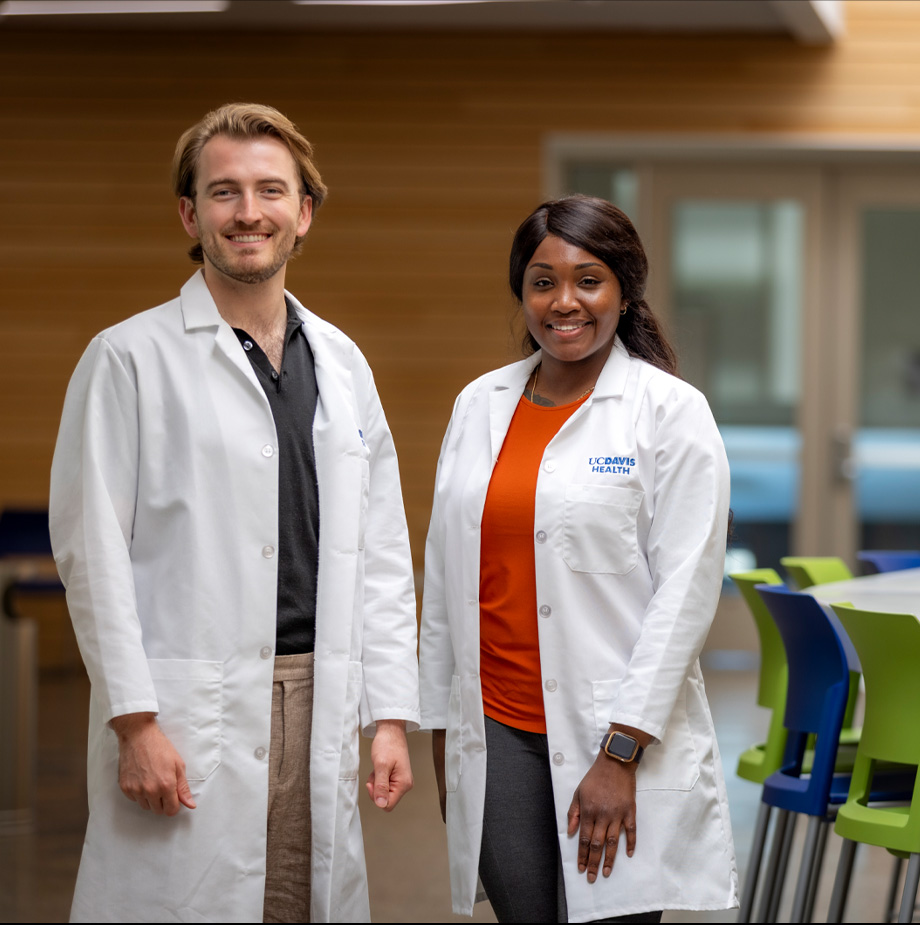
Meeting the need
With 40 million residents, the state has a growing need for anesthesia services, especially as its aging population requires more procedures. The demand for anesthesia providers continues to outpace supply nationwide. By 2033, the anesthesiology workforce — including anesthesiologists, CRNAs and assistants — may experience a shortage of approximately 12,500 providers. CRNAs help address the shortage because they are highly trained to give anesthesia safely and can provide the same care, especially in places where there aren’t enough doctors.
In addition, non-operating-room anesthesia facilities are increasing due to technological advancements, which require more anesthesia care beyond traditional surgical settings. Such is the case with the 48X Complex at UC Davis Health. When it opens to patients on July 1, the $589 million modern surgical center will expand the capacity of rooms for adult same-day surgery. The DNP-NP students will get to train there.
The opportunities at UC Davis Health and across the UC system were among the reasons Dominique Perry decided to enroll in the program.
“I want to practice to my full scope. I’m hungry to practice independently,” said Perry, a trauma nurse at Community Regional Medical Center in her hometown, Fresno. “This program will prepare me to go to any setting, take the complex cases and serve in underserved communities.”
Perry and the 15 other students now return home to begin their hybrid education. The next 36 months will be dedicated to becoming skilled CRNAs — online and in simulations and clinicals — who provide culturally humble care and drive health care innovation through sustainable and forward-thinking practice.
Sareerak is humbled by this opportunity to train the next generation of nurse anesthetists.
“This isn’t just about helping students get through anesthesia school,” he said. “It’s about preparing them to thrive and lead in their future careers.”


